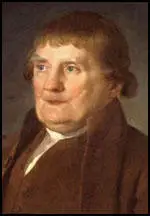William Dillwyn

William Dillwyn was born in Philadelphia in 1743. A former assistant to Anthony Benezet, he moved to england in 1774 where he established himself in business. Dillwyn, who was a Quaker, married Sarah Weston in 1777, and they settled at Higham Lodge, Walthamstow. They had eight children.
Dillwyn was opposed to the slave-trade. At his home he tutored Thomas Clarkson in the anti-slavery movements on both sides of the Atlantic. Dillwyn told Clarkson about the work of James Ramsay and Granville Sharp and the attempts by the Society of Friends to bring an end to the trade.
In 1784 Dillwyn joined forces with John Lloyd to publish The Case of our Fellow Creatures, the Oppressed Africans. Dillwyn argued that the slave-trade went against the teachings in the Bible: "It would surely have been more constant with the avowed principles of Englishmen, both as men and as Christians, if their settlement in heathen countries had been succeeded by mild and benevolent attempts to civilize their inhabitants, and to incline them to receive the glad tidings of the gospel. But how different a conduct towards them has been pursued. It has not only been repugnant, in a political view, to those commercial advantages which a fair and honourable treatment might have procured, but has evidently tended to increase the barbarity of their manners, and to excite in their minds an aversion to that religion."
Dillwyn claimed that the slave-trade encouraged wars between the different tribal groups in Africa: "This traffic is the principal source of the destructive wars which prevail among these unhappy people, and is attended with consequences, the mere recital of which is shocking to humanity. The violent reparation of the dearest relatives, the tears of conjugal and parental affection, the reluctance of the slaves to a voyage from which they can have no chance of returning, must present scenes of distress which would pierce the heart of any, in whom the principles of humanity are not wholly effaced. This, however, is but the beginning of sorrows with the poor captives."
Slavery in the United States (£1.29)
In 1787 Dillwyn, Thomas Clarkson and Granville Sharp formed the Society for the Abolition of the Slave Trade. Although Sharp and Clarkson were both Anglicans, nine out of the twelve members on the committee, were Quakers. This included John Barton (1755-1789); George Harrison (1747-1827); Samuel Hoare Jr. (1751-1825); Joseph Hooper (1732-1789); John Lloyd (1750-1811); Joseph Woods (1738-1812); James Phillips (1745-1799) and Richard Phillips (1756-1836). Influential figures such as John Wesley, Josiah Wedgwood, James Ramsay, Charles Middleton and William Smith gave their support to the campaign.
William Dillwyn, aged 81, died on 28th September 1824, and was buried in the Friends' Burial Ground in Tottenham.
Primary Sources
(1) William Dillwyn and John Lloyd, The Case of our Fellow Creatures, the Oppressed Africans (1784)
It would surely have been more constant with the avowed principles of Englishmen, both as men and as Christians, if their settlement in heathen countries had been succeeded by mild and benevolent attempts to civilize their inhabitants, and to incline them to receive the glad tidings of the gospel. But how different a conduct towards them has been pursued. It has not only been repugnant, in a political view, to those commercial advantages which a fair and honourable treatment might have procured, but has evidently tended to increase the barbarity of their manners, and to excite in their minds an aversion to that religion...
This traffic is the principal source of the destructive wars which prevail among these unhappy people, and is attended with consequences, the mere recital of which is shocking to humanity. The violent reparation of the dearest relatives, the tears of conjugal and parental affection, the reluctance of the slaves to a voyage from which they can have no chance of returning, must present scenes of distress which would pierce the heart of any, in whom the principles of humanity are not wholly effaced. This, however, is but the beginning of sorrows with the poor captives...
Under their cruel treatment on the ships, where, without regard to health or decency, hundreds are confined within the narrow limits of the hold, numbers perish; and, by what is called the seasoning in the islands, many are relieved by a premature death, from that suffering.
(2) William Dillwyn and John Lloyd, The Case of our Fellow Creatures, the Oppressed Africans (1784)
In procuring slaves from the coast of Africa, many children are stolen privately; wars also are encouraged among the negroes: but all is at a great distance. Many groans arise from dying men, which we hear not. Many cries are uttered by widows and fatherless children, which reach not our ears. Many cheeks are wet with tears, and faces sad with unutterable grief, which we see not. Cruel tyranny is encouraged. The hands of robbers are strengthened; and thousands reduced to the most abject slavery, who never injured us.

